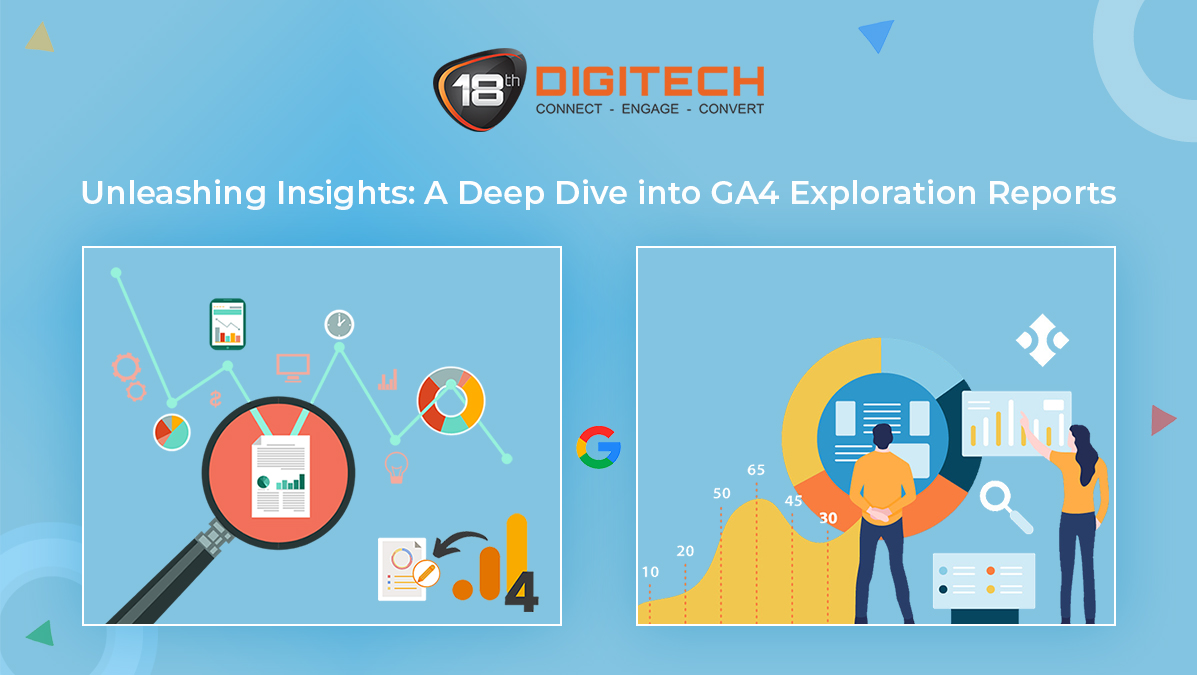Google Analytics 4 came with a new feature, exploration reports, that you can find in the left-hand menu under ‘explore’. These reports offer a flexible reporting style using different technologies that allow you to gain deeper insights into your data and user behaviour on your website.
Different metrics, dimensions, and segments allow users to group and pull apart data to answer any business questions that may arise.
Note:
- Quantitative measurements like the number of sessions or total users are categorized under metrics.
- Dimensions include attributes that your data might have including page URL, which shows the URL of the page viewed.
- Segments are used as a subset of your total data.
In this blog, we have discussed the
Different Exploration Techniques
- Path Exploration: Path exploration allows you to understand how users navigate your website and the paths they take to navigate through your website’s pages, especially if you wish to motivate your users to reach the conversion page and checkout. This would help you get an idea about the pages or events that are leading users to drop off. Too many loops can confuse the users, leading to other forms of research like heatmaps, and session recordings on the pages these pages. These reports help in determining what could be confusing the users and eliminate the friction point.
- Funnel Exploration: Defining a funnel on a website, especially an eCommerce site, allows users to determine at what step the users are abandoning the funnel which will help you understand and optimise the steps to enhance conversion rates by pushing users down the funnel. At the same time, you can also create audiences from each step of the funnel and implement them as a remarketing strategy or for running a/b tests to check what converts better for that specific audience.
- Segment Overlap Exploration: Every business owner wants a segregated listing of their website traffic based on specific regions, devices, and other such criteria. GA4’s segment overlap exploration helps you check how different segments overlap with each other. This information is beneficial in finding commonalities, focusing on those segments more than others.
- User Lifetime Exploration: This report gives a user-breakdown and their expected lifetime value. You can also get insights on unique user behaviour including details such as the last item the user purchased and the campaigns that led to more purchases. The demographic segment is another way to understand the demographics that are your most valuable users and optimise your marketing plans accordingly.
- Cohort Exploration: The GA4 exploration report provides you with information about the way a group of users with shared characteristics behave over a period of time. Cohort explorations help in understanding how these users react to different strategies and user engagement changes with time. With GA4, you can choose the type of event you want to use as Cohort Inclusion criteria either from pre-defined or other custom events. Other than this, there are Return Criteria. Finally, you have the calculation methods- standard, rolling, and cumulative.
- Landing Pages Exploration: Adding landing page dimension in the standard reports is another advantage; which is slightly problematic should you wish to know the source of your users and the devices they are using, or the country they’re in. Creating a free form report for landing pages helps use these segments and provides you with more contexts about your traffic’s behaviour. At the same time, knowing the overall performance of your landing page is also important as it helps you determine your source of traffic generation.
- Conversions Exploration: Conversions are one of the most important metrics for determining a website’s performance, which most of the standard GA4 reports show. However, there isn’t much to do with these standard reports, especially if you want to know conversions by device, source, or country. You can solve this issue by applying segments in your GA4 exploration reports. Try starting with GA4 exploration’s default template and eventually add metrics like session or user conversion rate, or you can customise the report as you please.
- Site Search Exploration: Having your site search enabled will allow you to pick those search terms in your GA4 exploration reports that would help you know what your visitors are looking for on your website. Using this information, you can make it easy for your visitors to locate what they are searching for, and use it in your remarketing campaigns, or messaging that would resonate with your audience.
- Experiment Results Exploration: Test result is one of the integral tasks you would be doing if you are in the conversion rate optimisation business where standard reports won’t be of much help. Although Google Optimise sends these events to GA4, you would have to add these events as custom definitions to use them in GA4 exploration reports.
- Purchasers & Non-Purchasers Exploration: Separating users who purchase from your website from the ones who don’t is always helpful. It is always beneficial for you to know if a certain promotion pushed their conversion to understand the impact of your promotional actions. Creating a free-form exploration with segments for purchasers and non-purchasers can help gain this insight. You can choose the conversion events that lead to purchases for the non-purchasers segment and exclude them if their number of events is greater than 0. On the other hand, for purchasers, you can choose all the conversion events that amount to the purchase and include them if the event count is greater than 0.
Wrapping Up,
Now that you are aware of the different GA4 exploration reports, you can start with customised reports in GA4. These exploration techniques help in serving specific purposes; hence, you need to know their differences. That being said, you would not be using all these reports in your daily work. Therefore, it is not mandatory to be an expert in all of them.
If GA4 seems overwhelming, reach out to 18th DigiTech, your trusted SEO consultant in India. Our experts offer personalized assistance for GA4 implementation and upgraded features. Contact us now!









 About 18th Digitech
About 18th Digitech Awards and Credentials
Awards and Credentials Our Partners
Our Partners
